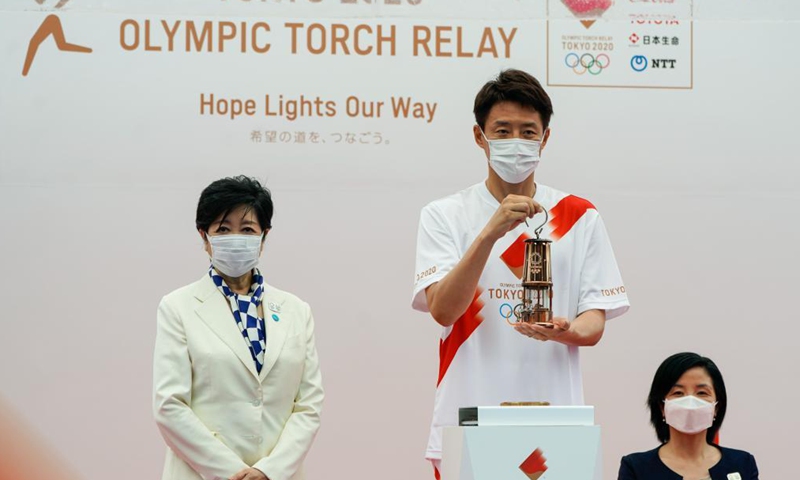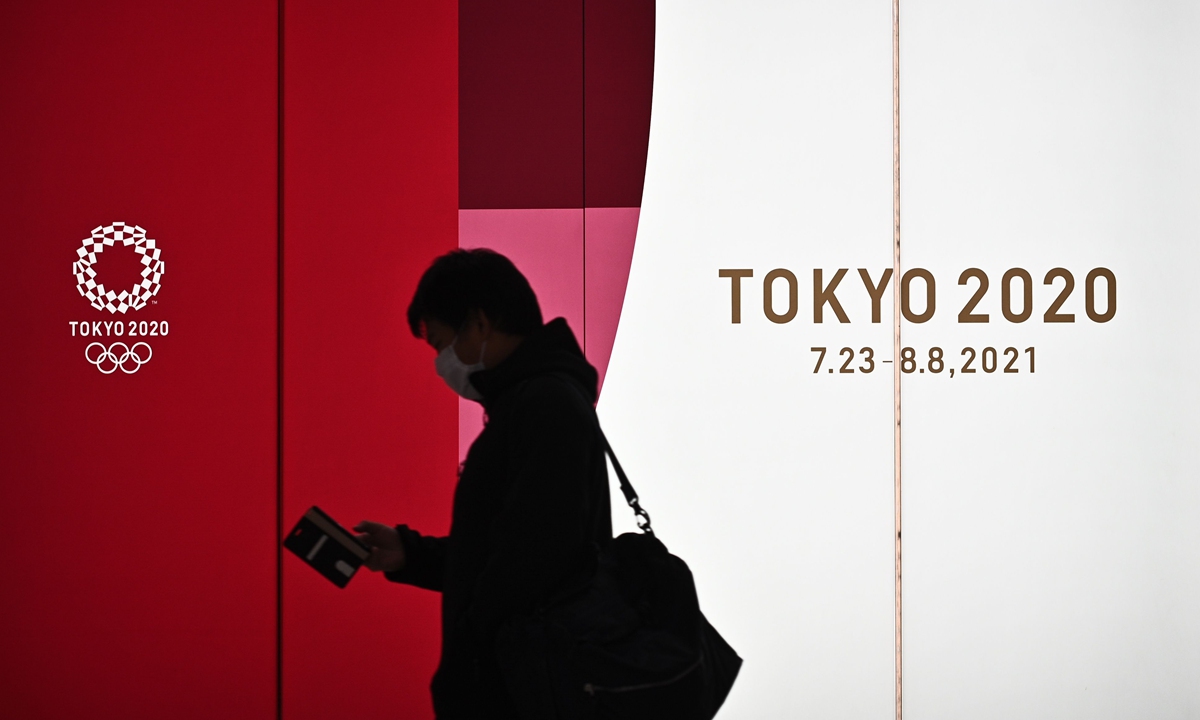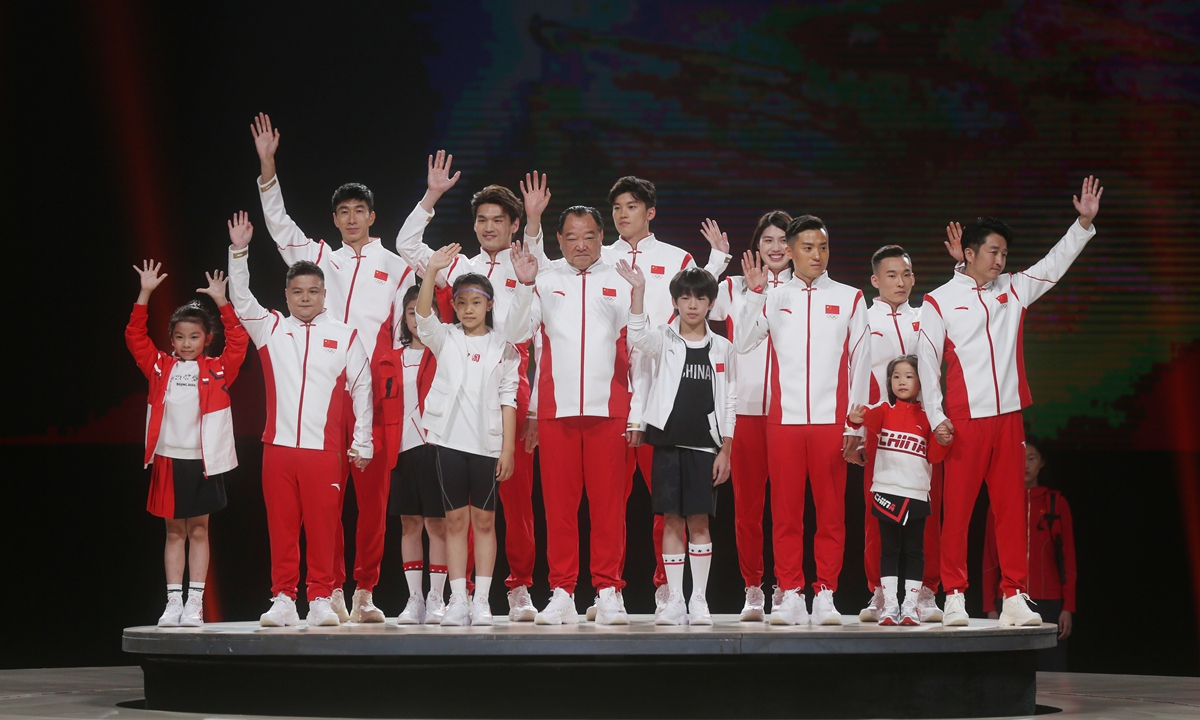
Governor of Tokyo Koike Yuriko (L), Official Ambassador of the Tokyo 2020 Torch Relay Taguchi Aki (R), and Japanese former professional tennis player Matsuoka Shuzo attend the unveiling ceremony for the Olympic Flame of the Olympic Torch Relay in Tokyo, Japan on July 9, 2021.Photo:Xinhua
With International Olympic Committee (IOC) President Thomas Bach's arrival in Tokyo on Thursday, the world has officially entered a special Olympic time, as the Japanese organizer announced on the same day that spectators will be banned from most of the event under the fourth state of emergency in Tokyo.
Two weeks before the opening of the postponed Olympics, the first to be held in a pandemic, the Tokyo segment of the Olympic torch relay started with a small-scale ceremony, with little fanfare for the passing of the torch at Komazawa Olympic Park, Japanese media reported.
A source close to China's Olympic delegation told the Global Times on Friday that Team China will have a ceremony on July 15, before their trip to Tokyo. A farewell ceremony was held at the Hong Kong Special Administrative Region on Thursday, with the city's chief executive Carrie Lam's pep talk.
The China [mainland] delegation has 413 athletes, similar to the last Olympics in Rio de Janeiro, Brazil. Team China's list has been confirmed in almost all sports. including women's football and volleyball.
In an anti-pandemic themed promotional video released by Xinhua News Agency on Thursday, China's Olympians train on empty fields, in their own rooms and in hotel corridors. And there are also health workers who vaccinate people against COVID-19, workers who are disinfecting stadium and others dedicated to the Olympic cause.
About 11,000 athletes from 200 countries and regions are expected to arrive in Japan. The number of athletes is larger than the 10,500 athletes in Rio de Janeiro. As the host, Japan will field 582 athletes, media reported.
As the epidemic continues to surge in Japan, the safety of delegations has become a vital issue. Japan, with a two-dose vaccination about 16 percent of its total population, reported 2,230 domestically-transmitted cases on Thursday. At least 14 Olympic staff members have been infected by coronavirus since July, media reported.
According to Japanese government regulation, an Olympic-related person who arrives in Japan in July must take two nucleic acid tests within 96 hours before boarding; a virus test will be also conducted at the airport when entering Japan. During the Tokyo Olympics, all athletes must be tested daily.
If one member of a foreign delegation is infected, the entire team will be quarantined in a single room in the hotel until they are confirmed healthy.

Tokyo Olympics Photo: VCG
Uphill task The Japanese government announced on March 20 that the Tokyo Olympics and Paralympics this summer will be closed to foreign spectators, the first time in modern Olympic history. With the recently announced almost full-closure to local residents, observers say the economic loss for Japan will be huge.
Media reported that the Japan Olympic Committee is aiming to earn around 90 billion yen ($800 million) in ticket sales, but now it would be close to zero.
Sponsors have also expressed dismay. Citing sources, Reuters said Tokyo Olympic sponsors are cancelling or scaling back booths and promotional events tied to the event.
As the only Chinese "Worldwide Olympic Partner" for the Tokyo Olympics, Alibaba told the Global Times that they are still trying to support the event with cutting-edge technology and will issue a formal press release on July 19 or 20.
Some Chinese in Japan reached by Global Times said that the average Japanese is not enthusiastic about the Olympics, as they will watch baseball and softball, or sports in which Japan has a chance to win gold.
Surnamed Zhang, a Kyoto-based Chinese student told the Global Times on Friday that many Japanese are not that pleasant about "taking taxpayers' money to undertake a laborious event that many people have little interest in."
The Japanese public's discontent about the government's efforts to control the outbreak and vaccination campaign may have transferred to the hosting of the Olympics, he said, noting it seems unrealistic for Japan to hope that hosting the Olympics will boost its international standing while following US in politics.
It's not easy for Japan to host a Summer Olympics amid an epidemic without any "reference" to follow, Wang Dazhao, a Beijing-based sports commentator, told the Global Times on Friday.
"But "Japan's hosting will be the reference for the Beijing Winter Olympics which is very likely to be held amid the pandemic as well... Whether it is a success or not, the international community should offer more support and tolerance and take concrete action to help Japan tide over the difficulties," Wang said.
In March, Bach confirmed that the Chinese Olympic Committee has offered vaccine doses for participants at this year's Tokyo Olympics.
Ren Hai, a professor at the Olympic Research Center of Beijing Sports University, told the Global Times on Friday that Beijing 2022 organizing committee will pay close attention to the Tokyo Olympics, drawing lessons from its experience in balancing epidemic control, social interaction and sports events.
By looking at Tokyo, Beijing will think about how to form a consensus among the residents, the sports bureau and the government to carry forward the Olympic values, Ren said.
"The epidemic has further polarized the world… How to use sports events to help the world communicate and ease tensions is also a question for both Tokyo and Beijing to think about," the expert said.

China reveals the outfit to be used by Chinese athletes who win medals at the Tokyo Olympics on Friday in Beijing. Chinese brand Anta sponsored the outfit, which uses a stand-up collar and special buckle of traditional Chinese attire. Photo: Cui Meng/GT
Packed up and ready In the context of the pandemic and political chaos, such as provocations by some Japanese politicians toward China over the Taiwan question, analysts said China's positive participation in the Games complies with the Olympic Charter and shows the spirit of humanity.
Analysts said Team China is still in the running as the top medal winner as the pandemic has brought uncertainty to the performance of athletes around the world.
Sports commentators said that in traditionally strong sports such as weightlifting, diving, table tennis and badminton, China has a good chance to win. China has won 28 of 32 gold medals in table tennis since the 1988 Olympics.
The Chinese gymnastics team's worst performance was at the Rio Olympics with no gold and no silver. This time, Ren Miuzhong, director of the Chinese Gymnastics Administration Center, said that China has the potential to win gold medals in six gymnastics events.
Given the efforts of the athletes and the special significance of the Olympic spirit to humanity during the pandemic, experts say any boycott of the Games would be irrational. People also need to pay attention to the fact that the Olympics is losing its appeal.
The Olympic Games is necessary not only because it represents mankind's yearning for peace and a better life, but also because, from a practical level, most of the sports are being conducted on the framework of the Olympics in regular seasons, and the Olympic Committee integrates most of the sports organizations, Ren Hai said.
According to Ren's research, the Olympics' appeal among young people has declined in recent years, with most Olympic viewers being over 45 since the Games was first televised at the Tokyo Olympics in 1964.
"The lack of spectators at the Tokyo Olympic Games will further this trend. Some Olympic events are not in line with the lifestyle and ecological trend of sports development," the expert said.
The Games offer an opportunity for people to reflect on the need for the regeneration of sports in the post-industrial era, and the need for Olympic sports to be integrated into life, not divorced from it, Ren said.
Facing the pandemic, people should also think about how mankind can use the sportsmanship embodied in the Olympic Games to live in peace and harmony with nature, Ren noted.






